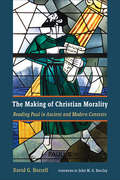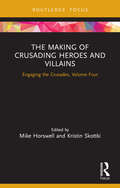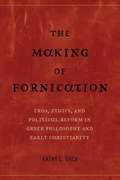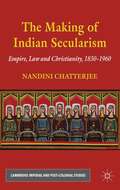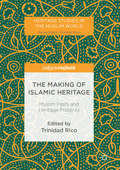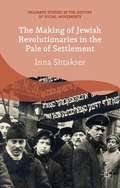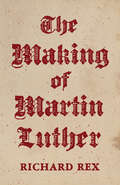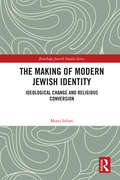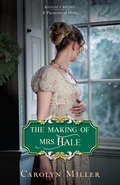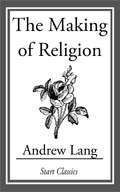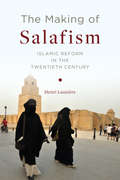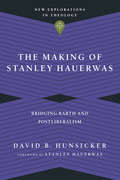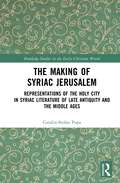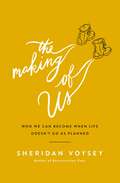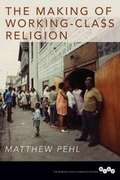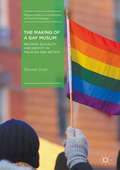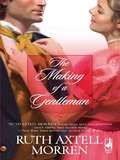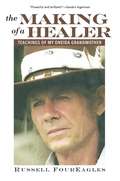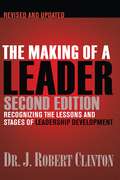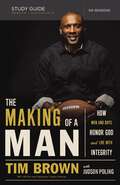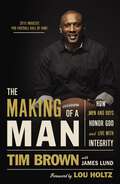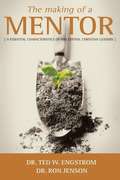- Table View
- List View
The Making of Christian Morality: Reading Paul in Ancient and Modern Contexts
by David G. Horrell John M. BarclayIn this volume David Horrell focuses on themes of community, ethics, and ecology in Paul, moving from the concrete social circumstances in which the earliest Christian communities gathered to the appropriation of Paul’s writings in relation to modern ethical challenges. Often questioning established consensus positions, Horrell opens up new perspectives and engages with ongoing debates both in Pauline studies and in contemporary ethics.After covering historical questions about the setting of the Paul-ine communities, The Making of Christian Morality analyzes Paul-ine ethics through a detailed study of particular passages. In the third and final section Horrell brings Pauline thought to bear on contemporary issues and challenges, using the environmental crisis as a case study to demonstrate how Paul’s ethics can be appropriated fruitfully in a world so different from Paul’s own.
The Making of Christian Morality: Reading Paul in Ancient and Modern Contexts
by David G. HorrellIn this volume David Horrell focuses on themes of community, ethics, and ecology in Paul, moving from the concrete social circumstances in which the earliest Christian communities gathered to the appropriation of Paul&’s writings in relation to modern ethical challenges. Often questioning established consensus positions, Horrell opens up new perspectives and engages with ongoing debates both in Pauline studies and in contemporary ethics.After covering historical questions about the setting of the Paul-ine communities, The Making of Christian Morality analyzes Paul-ine ethics through a detailed study of particular passages. In the third and final section Horrell brings Pauline thought to bear on contemporary issues and challenges, using the environmental crisis as a case study to demonstrate how Paul&’s ethics can be appropriated fruitfully in a world so different from Paul&’s own.
The Making of Crusading Heroes and Villains: Engaging the Crusades, Volume Four (Engaging the Crusades)
by JONATHAN PHILLIPS; MIKE HORSWELLEngaging the Crusades is a series of volumes which offer windows into a newly emerging field of historical study: the memory and legacy of the crusades. Together these volumes examine the reasons behind the enduring resonance of the crusades and present the memory of crusading in the modern period as a productive, exciting, and much needed area of investigation. This new volume explores the ways in which significant crusading figures have been employed as heroes and villains, and by whom. Each chapter analyses a case study relating to a key historical figure including the First Crusader Tancred; ‘villains’ Reynald of Châtillon and Conrad of Montferrat; the oft-overlooked Queen Melisende of Jerusalem; the entangled memories of Richard ‘the Lionheart’ and Saladin; and the appropriation of St Louis IX by the British. Through fresh approaches, such as a new translation of the inscriptions on the wreath laid on Saladin’s tomb by Kaiser Wilhelm II, this book represents a significant cutting-edge intervention in thinking about memory, crusader medievalism, and the processes of making heroes and villains. The Making of Crusading Heroes and Villains is the perfect tool for scholars and students of the crusades, and for historians concerned with the development of reputations and memory.
The Making of Fornication: Eros, Ethics, and Political Reform in Greek Philosophy and Early Christianity
by Kathy L. GacaSexual mores and practices, and the uses of sex in the properly regulated society, according to Greek philosophical schools and to some important early Christians. Gaca shows that the Christian thinkers did not form their ideas about sex from a basis in the Greek tradition, as Foucault thought and almost everybody else thinks.
The Making of Indian Secularism: Empire, Law and Christianity, 1830–1960
by Nandini ChatterjeeA unique study of how a deeply religious country like India acquired the laws and policies of a secular state, highlighting the contradictory effects of British imperial policies, the complex role played by Indian Christians, and how this highly divided community shaped its own identity and debated that of their new nation.
The Making of Islamic Heritage: Muslim Pasts and Heritage Presents (Heritage Studies in the Muslim World)
by Trinidad RicoThis book is open access under a CC BY 4. 0 license. Offering key insights into critical debates on the construction, management and destruction of heritage in Muslim contexts, this volume considers how Islamic heritages are constructed through texts and practices which award heritage value. It examines how the monolithic representation of Islamic heritage (as a singular construct) can be enriched by the true diversity of Islamic heritages and how endangerment and vulnerability in this type of heritage construct can be re-conceptualized. Assessing these questions through an interdisciplinary lens including heritage studies, anthropology, history, conservation, religious studies and archaeology, this pivot covers global and local examples including heritage case studies from Indonesia, Egypt, Saudi Arabia, Iran, Jordan, and Pakistan.
The Making of Jewish Revolutionaries in the Pale of Settlement
by Inna ShtakserThis book examines the emotional aspects of revolutionary experience during a critical turning point in both Russian and Jewish history - the 1905 revolution. Shtakser argues that radicalization involved an emotional transformation, which enabled many young revolutionaries to develop an activist attitude towards reality.
The Making of Liturgy in the Ottonian Church
by Henry ParkesThis highly original study examines the history and religious life of the Ottonian Church through its ritual books. With forensic attention to the writing and design of four important manuscripts from the city of Mainz - a musician's troper, a priest's ritual handbook, a bishop's pontifical and a copy of the enigmatic compilation now known as the 'Romano-German Pontifical' - Henry Parkes transforms liturgical sources into eloquent witnesses to the ecclesiastical history of early medieval Germany. He also presents the first comprehensive revision of Michel Andrieu's influential 'Romano-German Pontifical' theory, from the dual perspective of Mainz's cathedral of St Martin and its Benedictine monastery of St Alban. Challenging long-held assumptions about the geographies of Ottonian power, in particular the central role of Mainz and its archbishops, the book opens up important new ways of understanding how religious ritual was organised, transmitted and perceived.
The Making of Martin Luther
by Richard RexA major new account of the most intensely creative years of Luther's careerThe Making of Martin Luther takes a provocative look at the intellectual emergence of one of the most original and influential minds of the sixteenth century. Richard Rex traces how, in a concentrated burst of creative energy in the few years surrounding his excommunication by Pope Leo X in 1521, this lecturer at an obscure German university developed a startling new interpretation of the Christian faith that brought to an end the dominance of the Catholic Church in Europe. Luther’s personal psychology and cultural context played their parts in the whirlwind of change he unleashed. But for the man himself, it was always about the ideas, the truth, and the Gospel.Focusing on the most intensely important years of Luther’s career, Rex teases out the threads of his often paradoxical and counterintuitive ideas from the tangled thickets of his writings, explaining their significance, their interconnections, and the astonishing appeal they so rapidly developed. Yet Rex also sets these ideas firmly in the context of Luther’s personal life, the cultural landscape that shaped him, and the traditions of medieval Catholic thought from which his ideas burst forth.Lucidly argued and elegantly written, The Making of Martin Luther is a splendid work of intellectual history that renders Luther’s earthshaking yet sometimes challenging ideas accessible to a new generation of readers.
The Making of Modern Jewish Identity: Ideological Change and Religious Conversion (Routledge Jewish Studies Series)
by Motti InbariThis volume explores the processes that led several modern Jewish leaders – rabbis, politicians, and intellectuals – to make radical changes to their ideology regarding Zionism, Socialism, and Orthodoxy. Comparing their ideological change to acts of conversion, the study examines the philosophical, sociological, and psychological path of the leaders’ transformation. The individuals examined are novelist Arthur Koestler, who transformed from a devout Communist to an anti-Communist crusader following the atrocities of the Stalin regime; Norman Podhoretz, editor of Commentary magazine, who moved from the New Left to neoconservative, disillusioned by US liberal politics; Yissachar Shlomo Teichtel, who transformed from an ultra-Orthodox anti-Zionist Hungarian rabbi to messianic Religious-Zionist due to the events of the Holocaust; Ruth Ben-David, who converted to Judaism after the Second World War in France because of her sympathy with Zionism, eventually becoming a radical anti-Israeli advocate; Haim Herman Cohn, Israeli Supreme Court justice, who grew up as a non-Zionist Orthodox Jew in Germany, later renouncing his belief in God due to the events of the Holocaust; and Avraham (Avrum) Burg, prominent centrist Israeli politician who served as the Speaker of the Knesset and head of the Jewish Agency, who later became a post-Zionist. Comparing aspects of modern politics to religion, the book will be of interest to researchers in a broad range of areas including modern Jewish studies, sociology of religion, and political science.
The Making of Mrs. Hale (Regency Brides: A Promise of Hope #3)
by Carolyn MillerMarry in haste, repent in leisure—Mrs. Hale is about to find out how painful that repentance can truly be.Julia Hale ran off to be married in Gretna Green, following romance instead of common sense. But her tale isn't turning into a happily ever after. Her new husband is gone and she doesn't know where—or if he's ever coming back. Julia has no option but to head home to the family she betrayed by eloping and to hope they'll forgive her. Especially now that she might be carrying a baby from her brief marriage.Carolyn Miller's clean and wholesome Regency romances continue with The Making of Mrs. Hale, following familiar characters as they learn how restoration can occur by finding hope and healing through a deep relationship with God. Full of rich historical details and witty banter, this series continues to draw in fans of Jane Austen, Sarah Ladd, and Julie Klassen."Carolyn Miller gets better and better with each book!" - Becky "This entire series is going straight to my all-time favorites shelf!" - Beth Erin"My girls and I have fallen in love with the Regency Brides series." - Ann Hibbard Regency Brides: A Legacy of GraceThe Elusive Miss EllisonThe Captivating Lady Charlotte
The Making of Religion
by Andrew LangAndrew Lang (1844-1912) was a prolific Scots man of letters, a poet, novelist, literary critic and contributor to anthropology. He now is best known as the collector of folk and fairy tales. He was educated at the Edinburgh Academy, St Andrews University and at Balliol College, Oxford. As a journalist, poet, critic and historian, he soon made a reputation as one of the ablest and most versatile writers of the day. Lang was one of the founders of the study of "Psychical Research," and his other writings on anthropology include The Book of Dreams and Ghosts (1897), Magic and Religion (1901) and The Secret of the Totem (1905). He was a Homeric scholar of conservative views. Other works include Homer and the Epic (1893); a prose translation of The Homeric Hymns (1899), with literary and mythological essays in which he draws parallels between Greek myths and other mythologies; and Homer and his Age (1906). He also wrote Ballades in Blue China (1880) and Rhymes la Mode (1884).
The Making of Salafism: Islamic Reform in the Twentieth Century (Religion, Culture, and Public Life #31)
by Henri LauzièreSome Islamic scholars hold that Salafism is an innovative and rationalist effort at Islamic reform that emerged in the late nineteenth century but gradually disappeared in the mid twentieth. Others argue Salafism is an anti-innovative and antirationalist movement of Islamic purism that dates back to the medieval period yet persists today. Though they contradict each other, both narratives are considered authoritative, making it hard for outsiders to grasp the history of the ideology and its core beliefs.Introducing a third, empirically based genealogy, The Making of Salafism understands the concept as a recent phenomenon projected back onto the past, and it sees its purist evolution as a direct result of decolonization. Henri Lauzière builds his history on the transnational networks of Taqi al-Din al-Hilali (1894–1987), a Moroccan Salafi who, with his associates, participated in the development of Salafism as both a term and a movement. Traveling from Rabat to Mecca, from Calcutta to Berlin, al-Hilali interacted with high-profile Salafi scholars and activists who eventually abandoned Islamic modernism in favor of a more purist approach to Islam. Today, Salafis tend to claim a monopoly on religious truth and freely confront other Muslims on theological and legal issues. Lauzière's pathbreaking history recognizes the social forces behind this purist turn, uncovering the popular origins of what has become a global phenomenon.
The Making of Stanley Hauerwas: Bridging Barth and Postliberalism (New Explorations in Theology)
by David B. HunsickerIn the past half-century, few theologians have shaped the landscape of American belief and practice as much as Stanley Hauerwas.Hauerwas is often associated—and rightly so—with the postliberal theological movement and its emphasis on a narrative interpretation of Scripture. Yet he also claims to stand within the theological tradition of Karl Barth, who strongly affirmed the priority of Jesus Christ in all matters and famously rejected Protestant liberalism. These are two rivers that seem to flow in different directions.andFeaturing new monographs with cutting-edge research, New Explorations in Theology provides a platform for constructive, creative work in the areas of systematic, historical, philosophical, biblical, and practical theology.
The Making of Syriac Jerusalem: Representations of the Holy City in Syriac Literature of Late Antiquity and the Middle Ages (Routledge Studies in the Early Christian World)
by Catalin-Stefan PopaThis book discusses hagiographic, historiographical, hymnological, and theological sources that contributed to the formation of the sacred picture of the physical as well as metaphysical Jerusalem in the literature of two Eastern Christian denominations, East and West Syrians. Popa analyses the question of Syrian beliefs about the Holy City, their interaction with holy places, and how they travelled in the Holy Land. He also explores how they imagined and reflected the theology of this itinerary through literature in Late Antiquity and the Middle Ages, set alongside a well-defined local tradition that was at times at odds with Jerusalem. Even though the image of Jerusalem as a land of sacred spaces is unanimously accepted in the history of Christianity, there were also various competing positions and attitudes. This often promoted the attempt at mitigating and replacing Jerusalem’s sacred centrality to the Christian experience with local sacred heritage, which is also explored in this study. Popa argues that despite this rhetoric of artificial boundaries, the general picture epitomises a fluid and animated intersection of Syriac Christians with the Holy City especially in the medieval era and the subsequent period, through a standardised process of pilgrimage, well-integrated in the custom of advanced Christian life and monastic canon. The Making of Syriac Jerusalem is suitable for students and scholars working on the history, literature, and theology of Syriac Christianity in the late antique and medieval periods.
The Making of Us: Who We Can Become When Life Doesn’t Go As Planned
by Sheridan VoyseyBeautifully written and deeply poignant, The Making of Us allows readers to walk alongside author and radio personality Sheridan Voysey during a transformational moment in his life journey. Picking up where Resurrection Year: Turning Broken Dreams Into New Beginnings left off, Sheridan helps us process what we can learn about our identities in the face of disappointment and change. Life had not gone according to plan for Sheridan Voysey and his wife, Merryn. When infertility ended their dream of becoming parents, they uprooted their lives and relocated from Australia to Oxford, England, so Merryn could pursue her professional goals. But the move meant Sheridan had to give up his well-established career in Christian radio, and though he was experiencing some success as a writer, he couldn’t reconcile his expectations for his life with the reality he was living. Lost and directionless, he came to a sobering realization: I don’t know who I am.Following the example of many a seeker, Sheridan decided to pair his spiritual journey with a literal one: a hundred-mile pilgrimage along the northeast coast of England. Inspired by the life and influence of the monk Cuthbert, who was among the first to evangelize northern England in the 600s, Voysey and his friend DJ traveled on foot from the Holy Island of Lindisfarne to Durham, where the famed Lindisfarne Gospels were on display.What makes us who we are? What shapes our hopes and dreams, and how do we adjust when things don’t go as we hoped? Can we recover if we make a choice that’s less than perfect? Voysey tackles these questions and others as he deftly weaves together Cuthbert’s story, the history of early Christianity in England, and his own struggle to find his identity and purpose. His introspective writing leads readers to consider their own stories and reflect on how God calls each of us to an identity bigger than any earthly role or career. Part travel memoir, part pilgrim’s journal, The Making of Us is a quiet story including a chapter-by-chapter reflection guide, of trust in God’s leading for our lives, no matter where our paths take us.
The Making of Working-Class Religion
by Matthew PehlReligion has played a protean role in the lives of America's workers. In this innovative volume, Matthew Pehl focuses on Detroit to examine the religious consciousness constructed by the city's working-class Catholics, African American Protestants, and southern-born white evangelicals and Pentecostals between 1910 and 1969. Pehl embarks on an integrative view of working-class faith that ranges across boundaries of class, race, denomination, and time. As he shows, workers in the 1910s and 1920s practiced beliefs characterized by emotional expressiveness, alliance with supernatural forces, and incorporation of mass culture's secular diversions into the sacred. That gave way to the more pragmatic class-conscious religion cultures of the New Deal era and, from the late Thirties on, a quilt of secular working-class cultures that coexisted in competitive, though creative, tension. Finally, Pehl shows how the ideology of race eclipsed class in the 1950s and 1960s, and in so doing replaced the class-conscious with the race-conscious in religious cultures throughout the city.
The Making of a Gay Muslim
by Shanon ShahThis book highlights the lived experiences of gay Muslims in Malaysia, where Islam is the majority and official religion, and in Britain, where Muslims form a religious minority. By exploring how they negotiate their religious and sexual identities, Shah challenges the notion that Islam is inherently homophobic and that there is an unbridgeable divide between 'Islam' and the 'West'. Shah also gained access to gay Muslim networks and individuals for his in-depth research in both countries, and the book investigates the different ways that they respond to everyday anti-homosexual or anti-Muslim sentiments. Amid the many challenges they confront, the gay Muslims whom Shah encountered find innovative and meaningful ways to integrate Islam and gay identity into their lives. The Making of a Gay Muslim will appeal to students and scholars with an interest in contemporary Islam, religion, gender and sexuality.
The Making of a Gentleman
by Ruth Axtell MorrenJust moments from the hangman's noose, Jonah Quinn escapes from infamous Newgate Prison. Taking prison volunteer Florence Hathaway hostage is a masterstroke, but Jonah intends to end their acquaintance once he's free. God, however, has other plans. The caring spinster's mission is to turn Jonah's life around. The burly fugitive scoffs at the notion he can be groomed into respectability, much less win a royal pardon. He knows that donning a waistcoat and cravats does not change a man. But a woman's stubborn faith? That can accomplish miracles. Florence sees right into the depths of his roguish heart, and Jonah finds himself wanting to become that man she sees. . . .
The Making of a Healer
by Russell FoureaglesOnce Oneida healer Russell FourEagles (Atuneyute Keya) went to see his friend Bob, whom doctors had declared incurably paralyzed following a stroke. Within minutes of FourEagles' attention, Bob was kicking the covers off the bed. "You should write a book!" Bob later encouraged. And here it is. FourEagles' grandparents escaped the reservation-school education that obliterated Native American culture, preserving the healing abilities that can be traced in an unbroken lineage back two hundred grandmothers. In The Making of a Healer, he openly shares his knowledge in an effort to keep the old wisdom and practices from being forgotten. Recounting sacred Oneida myths and cosmology, he describes the healing powers of the Fire Ceremony, energy exchange, and humor; discusses natural remedies; and explains how he healed himself from post-traumatic stress disorder after serving in the Vietnam War.
The Making of a Leader: Recognizing the Lessons and Stages of Leadership Development (2nd Edition)
by J. Robert ClintonAfter examining the lives of hundreds of historical, biblical, and contemporary leaders, Dr. J. Robert Clinton gained perspective on how leaders develop over a lifetime. By studying the six distinct stages he identifies, you will learn to: Recognize and respond to God’s providential shaping in your life; Determine where you are in the leadership development process; Identify others with leadership characteristics; and Direct the development of future leaders. This revised and updated edition includes several new appendixes and expanded endnotes, as well as an application section at the end of each chapter.
The Making of a Man Study Guide: How Men and Boys Honor God and Live with Integrity
by Tim BrownWhat Does It Take to Be a Godly Man? Every young boy dreams about what he wants to be when he grows up. Some have goals of becoming an astronaut, or a fireman, or a professional athlete. But what does it take to be a man? How does a young person get there?In this six-session video-based curriculum, NFL All-Pro, sports analyst, and businessman Tim Brown uses experiences from his life to teach men the principles and priorities he has learned for leading a life that honors God. Through his stories of struggling with God, overcoming temptations, and discovering what it takes to be a good husband and father, he shares what true manhood is all about and what guys must do to attain it. These principles have helped Tim lead a life of honor and integrity that has made him one of the most respected men in the world of sports.The Making of a Man will not only inspire men of all ages but also challenge them to measure their lives and success by a higher standard.Designedfor use with The Making of a Man: A Video-basedStudy (978-0529-11308-5)
The Making of a Man: How Men and Boys Honor God and Live with Integrity
by Lou Holtz Tim Brown James LundWhat exactly is manhood? How do guys get there? Tim Brown won the Heisman Trophy at Notre Dame and starred in the NFL for seventeen seasons. He left the game as a Los Angeles and Oakland Raiders legend and one of the most respected men in sports. Now “Mr. Raider” shares his amazing journey—the triumphs, the heartbreaks, the struggles with women, Al Davis, and God—as well as the principles and priorities that made him the man he is today. Much more than a sports memoir, The Making of a Man reveals how faith, family, honor, and integrity have everything to do with true manhood and a life well-lived. Whether you are a rabid fan or have little interest in football, a young boy or already facing the fourth quarter of your life, these pages will both challenge and inspire you to become the man you’ve always known you could be. Back Cover:When a man comes into your life and shows you something about yourself that you didn’t know was in you, it’s remarkable. The Apostle Paul did that for Timothy, encouraging him to preach and teach and reminding him, “Do not neglect your gift” (1 Tim. 4:14). Paul was a mentor to Timothy, ready to point out the gifts of his protégé and willing to help develop those gifts and pass on his knowledge. Lou Holtz did the same for me, as well as for a whole lot of other guys. That’s what a mentor does. I’ll always be grateful that he inspired me to believe in myself. —Tim Brown Former Heisman Trophy Winner and NFL All-Pro “I’ve had the privilege of knowing Tim for over thirty years now. I’ve seen him beat the odds in many different areas of life, especially as a father and a mentor. I believe this book will help bring out your true greatness as you read stories about Tim’s successes and struggles, and as you’re inspired by his commitment to integrity as well as the life principles and the faith that have carried him through.” —Carey Casey, CEO, National Center for Fathering / fathers.com “Over the years, I’ve respected Tim Brown as an NFL opponent, a teammate, and a friend. In The Making of a Man, you will read what has made Tim the man he is today and learn vital lessons on what being a man is all about. Whether young or old, every guy should read this book.” —Jerry Rice, NFL Hall of Fame Wide Receiver Three-Time Super Bowl Champion
The Making of a Marriage
by Janet ThomaThis volume gives an idea of how to understand your partner, their needs and accordingly to make your marriage successful.
The Making of a Mentor: Nine Essential Characteristics of Influential Christian Leaders
by Ron Jenson Ted W. EngstromJesus ministered to many but focused on a few. What makes this strategy so compelling? Because he understood the secret of living forward—spiritual multiplication through intentionally influencing a few people at a time. He knew that by concentrating on a few faithful men and women they would leave behind them a legacy of people whose influence would extend beyond a generation or two; in fact, a legacy that would continue to multiply until he returned. This book is written to stimulate you, whatever your age, gender or position in life, toward a passionate desire to change people who will then change other people who will change other people. The key is not so much how you pour your life into people but that you are a person worth following. God placed you here to invest your life in others. This book will show you how to live and speak truth into the lives of others in a way that will transform them forever. Some of the essential leadership characteristics discussed in this book: -Self-discipline -Encouragement -Gentleness -Confrontation
